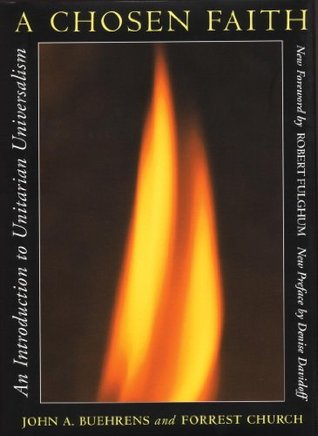More on this book
Kindle Notes & Highlights
Read between
January 20 - January 27, 2019
Religion is our human response to the dual reality of being alive and having to die.
“What doth the Lord require of thee but to do justice, to love mercy, and to walk humbly with thy God?” (Mic. 6:8).
Reinhold Niebuhr once said, “afflict the comfortable and comfort the afflicted.”
The great end in religious instruction, is not to stamp our minds upon the young, but to stir up their own; not to make them see with our eyes; but to look inquiringly and steadily with their own; not to give them a definite amount of knowledge, but to inspire a fervent love of truth; not to form an outward regularity, but to touch inward springs; not to bind them by ineradicable prejudices to our particular sect or peculiar notions, but to prepare them for impartial, conscientious judging of whatever subjects may be offered to their decision; not to burden the memory, but to quicken and
...more
Origen of Alexandria,
“God has not destined us for wrath, but for salvation” (I Thess. 5:9). Judith Sargent, a young widow
“The Universalists believe that God is too good to damn them,” said Starr King, “whereas the Unitarians believe they are too good to be damned!”
work with
that created us; it is celebration of life; it is being in love with goodness and justice;
“How can you be so sure of what you cannot see? We all are like unsighted people in this world. We cannot see God. Nor can we know what is going to happen after we die. Each one of you may be partly right in your answers. Yet none of you is fully right. Let us not quarrel over what we cannot be sure of.”
A rabbi spoke with God about heaven and hell. “I will show you hell,” God said, and they went into a room which had a large pot of stew in the middle. The smell was delicious, but around the pot sat people who were famished and desperate. All were holding spoons with very long handles which reached to the pot, but because the handles of the spoons were longer than their arms, it was impossible to get the stew back into their mouths. “Now I will show you heaven,” God said, and they went into an identical room. There was a similar pot of stew, and the people had identical spoons, but they were
...more
“What does the Lord require of you,” the prophet Micah asked, “but to do justice, love mercy, and walk humbly with your God.”
Blessed are the poor in spirit, for they know the unutterable beauty of simple things. Blessed are those who mourn, for they have dared to risk their hearts by giving of their love. Blessed are the meek, for the gentle earth shall embrace them and hallow them as its own. Blessed are those who hunger and thirst for righteousness, for they shall know the taste of noble thoughts and deeds. Blessed are the merciful, for in return theirs is the gift of giving. Blessed are the pure in heart, for they shall be at one with themselves and the universe. Blessed are the peacemakers, for theirs is a
...more
Love is reverence for life,
“God is not here or there, to be possessed,” said Martin Buber, “but is everywhere, to be met. It is only we who are not always there.”
We need to invest a little of our precious freedom and bond ourselves to others in redemptive community.
WE ONLY KNOW two things for certain: “I am,” and “I will die.” Religion is our response. Whether
Ours is a church of reason—not because the mind is free of errors, but because the dialogue of mind with mind, and mind with itself, refines religious thought. Ours is a church of moral work—not because we think morality is a sufficient religion, but because we know no better way of showing our gratitude to God, and our confidence in one another. Ours is a church of conscience—not because we hold that conscience is infallible, but because it is the meeting place of God and the human spirit. Ours is a non-creedal church—not because we have no beliefs, but because we will not be restrained in
...more
“In returning and rest shall ye be saved; in quietness and confidence shall be your strength,”


